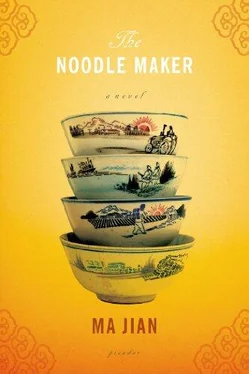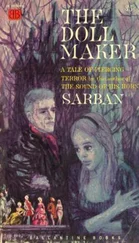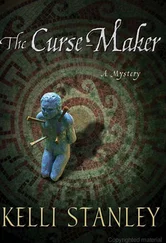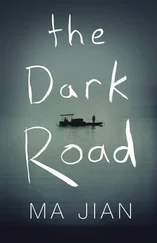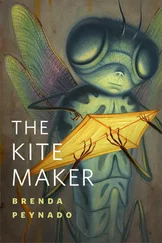When he had this dream several years later, the dustbin ended up boarding a plane. He was standing on a bus at the time, having spent an afternoon of passion with his young mistress in a ruined factory by the sea. The bus was jolting from side to side. While his body was still weak from the ejaculation and his heart still beating fast, he pulled the purple dustbin out of the plane and dragged it down into the ocean. The dustbin then became a mass of white manuscript paper drifting through his head. ‘Like birds in flight,’ he murmured as he returned to his senses.
(‘I like being around unhappy people,’ the blood donor says.
The writer remembers that the man sitting beside him was once famed for his ability to pass wind. In the re-education camp, he once farted thirty-six times in one day. The writer also recalls how his friend bought a handful of lice off a villager for five yuan, then hid them under the quilt of Commander Li to punish him for snoring so loudly in his sleep.
He’s capable of anything, the writer thinks to himself. But he’s never had any success with women. He doesn’t know how to treat them. All our old friends from the camp are married with children now, but he’s still single. Surely he must get lonely! The writer’s mind returns to the female novelist. During the Cultural Revolution, she was sent to a camp only eight kilometres away from theirs. She fell in love with Huang Gang there. He was a handsome young activist, the son of an ambassador, apparently. She and Huang Gang were the first couple in the area brave enough to live together without getting married. When they heard that the camp’s leaders were about to send the militia to arrest them on charges of illegal cohabitation, she went directly to the headquarters and threatened to kill herself if any of them laid their hands on her. There was a Communist Party membership badge with a picture of Chairman Mao pinned to her lapel at the time, so no one in the camp dared take the matter any further.
In her mind, Huang Gang was a modern-day Marx, and she was his Jenny, his political aid and lover. Had Huang Gang not been committed to a mental hospital a few years later, perhaps they would have married eventually, and she wouldn’t have ended up with the wretched editor. The only purpose the editor served her now was to act as a contrast to her own success. What she longed for, though, was a man of steel, a hero or Jesus figure, so that she could take on the role of a protective tigress, or of a spoilt, attention-seeking child. When the Marx she was infatuated with was toppled from his position by a rival clique, she immediately fell from grace. With no man in her life to order her about, she became embittered and arrogant.
Then she met the editor and fell in love. But soon after she married him, she discovered, to her dismay, that he was a weak and feeble character, and she longed all the more for a man who could strike her with a whip, then gently wipe away her tears. Her drive to find a new man propelled her out of the flat and into the arms of her admirers. She looked for things in other men that the editor couldn’t give her. One night, after one too many drinks, she visited the professional writer’s flat with a look of despair in her eyes. The writer understood that, having been raised by a strict Communist cadre, she was ill equipped to deal with the torments of love. He knew that despite her flamboyant exterior, her heart was empty.
‘We’re beyond salvation. There’s nothing any of us can do to help,’ the writer mumbles to himself in the dark.
‘I like to be with unhappy people,’ the blood donor repeats.
‘No one in this world is truly happy.’ The writer is still thinking about the female novelist and the editor.)
When winter was setting in, Old Hep would start dreaming about apples. He would burrow through the sweet juicy fruit like a worm, gorging himself on the ripe flesh, carving out paths in all directions, then smearing his excreta onto the walls with the tip of his tail, leaving dark brown tunnels behind. All he wanted was to eat, then lie down quietly to digest. Nobody could interfere with him inside the fruit, and since apples are meant to be eaten, they raised no objections either. He moved in wide circles around the core, occasionally breaking through the peel. For some reason, he was convinced that the capital lay at the core, and he was afraid to approach it. He suspected that Chairman Mao and the senior cadres of the Central Committee lived there. As long as he kept clear of the core, he felt free to eat and wander at his will. In the world of the juicy apple, he at last found some peace and contentment.
‘Is this not Communism?’ he often chuckled to himself, as he lay in bed next to his wife who was unaware of the dream he was having. His dreams were not always so enjoyable, though. Every year on National Day, he would dream he was climbing a silk-cotton tree that was circled by loaves of golden bread. He knew that if he didn’t control himself, he would end up scaling the trunk for ever. One night, as he reached for the highest branch, his wife shouted, ‘Get off me, you bastard!’ He woke to find himself clutching her hair. He quickly smoothed it back in place and fell asleep again, although he was too afraid to continue his dream.
It wasn’t until he had served eleven years as editor that Old Hep discovered the true worth of his position. By the end of the summer, he was neglecting his professional duties and focusing all his attention on finding women. Before his visit to a Beijing literary conference held by the Ministry of Culture that spring, he could never have contemplated the possibility that he might one day take a mistress. But at the conference, he met a poetess from Shijiazhuang who, just like his wife, smoked cigarettes and painted her nails red, and was even a Party member too. She was shorter than his wife, however, and had finer bones. During the official speeches, he kept glancing in her direction to check the expression on her face. On the first night, when he was walking along the hotel corridor on his way to the men’s bathroom, the poetess stuck her head around her door and called out to him. Her lights were on, but when he stepped inside her room, she switched them off and wrapped her arms around him. Her tender kisses soothed his nerves, and in less than a minute, his legs stopped shaking.
Two years later, he realised that ever since that night, he had tried to find in other women the sour, sooty smell that infused her hair and the inside of her cotton knickers. That night in Beijing, he learned that he too was capable of committing sinful acts. He said to himself, If a woman is willing to give her body to me, who am I to turn her down?
The following morning, the delegates convened in the conference room and continued their analysis of articles on the political rectification of cultural and artistic troupes. As Old Hep sat in his seat, he felt himself grow bigger and taller. He was wallowing in the joy of entering the sweet apple of Communism. His voice became fluid and natural. As he rose to deliver his speech, the poetess’s naked bottom flashed through his mind. He slowly removed the flowery knickers. Two plump, white buttocks …
‘There are no words to express the greatness of Chairman Mao’s thoughts on literature and art,’ he summed up at the end of his speech. ‘They are simply amazing!’
He returned home a different person. He was now a man of courage, a man who could possess other women.
Before the summer was over, he asked a girl from the local textile factory who was drawing some illustrations for his magazine whether she would like to go out on a date with him, and she accepted. So he took her to the woods behind Red Scarf Park. They sat on a bench and she sketched the golden sunset reflected on the surface of the lake. The water was calm and the air was filled with buzzing insects. The editor, who was now in his late forties, stood behind the girl and breathlessly stared at her delicate ear, and the small hand that was continually hooking a lock of hair behind it. He knew that every young woman in town dreamed of finding a permanent job in his editorial department, and that they regarded him as a successful and influential man. The textile worker had looked deeply flattered when he asked her out on this date. Indeed, he was everything she was looking for in a man. Fired with confidence, he rested his hand on the girl’s shoulder and commented on the branches she was drawing. A blush rose to the girl’s cheeks. Noticing the pencil start to shake in her hand, he moved in closer and wrapped his other arm around her. His balance was not good though, and as he leaned forward, his foot slipped, and he toppled awkwardly to the ground, bringing the girl down with him. He edged over, and without a word, climbed on top of her. She kept her eyes closed throughout, except at the moment of deepest pain, when she opened them briefly and looked into the sky, and saw the clouds turn from red to purple.
Читать дальше
